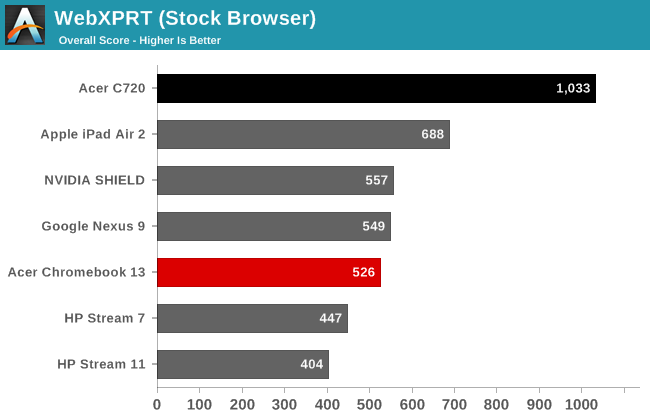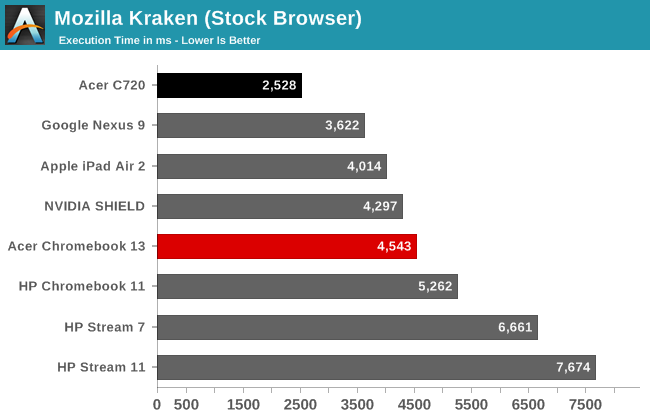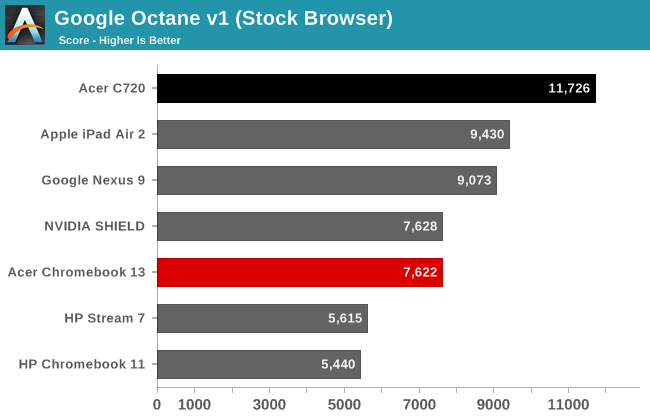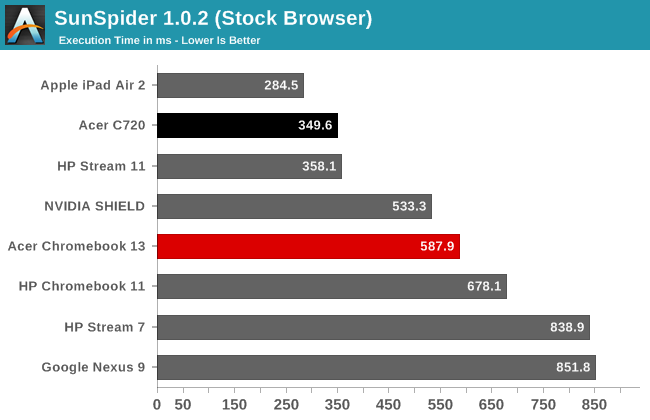Acer Chromebook 13: 1080p with Tegra K1
by Jarred Walton on January 23, 2015 10:00 AM ESTAcer Chromebook 13 Performance
I commented on the previous page that performance can at times feel lacking with the Chromebook 13. I think a large part of that comes from the NVIDIA Tegra K1 SoC, unfortunately. I’ve used an NVIDIA SHIELD, and going from an 8-inch tablet to a 13.3-inch laptop you’d think maybe they could push performance a bit more, but in most cases it’s a wash. Being a Chromebook (laptop), however, most sites will default to a heavier non-mobile view that can take a bit longer to fully process and display, and interactions with the laptop during this time can be very sluggish.
Benchmarks alone don’t necessarily convey the complete performance experience, so let me preface this section by saying that the older C720 was clearly more responsive in certain workloads. If you’ve never used the C720 then the Chromebook 13 won’t necessarily feel too slow, but switching between the two – or running tests simultaneously on both laptops – shows that while TK1 is more power friendly, the Haswell Celeron ends up being faster in nearly every computational workload. Even graphics doesn’t generally favor TK1, though the difference in screen resolution certainly plays a role as the C720 was only available with a 1366x768 panel.
For our performance testing of Chromebooks, we end up using a lot of tests that we run on tablets as there aren’t many Chromebook benchmarks. Also keep in mind that some of our Chromebook results are quite old (relatively speaking), so while we are running the latest build of Chrome OS on the C720 and CB13, the other Chromebooks were tested more than a year ago. We also aren’t able to test the older models on newer benchmarks, so some of our charts only have a few results. With that out of the way, here’s a quick look at performance.




| Additional Performance Results | ||
| Acer C720 | Acer CB13 | |
| CrXPRT | 96 | 55 |
| CrXPRT Battery (Hours) | 8.52 | 9.9 |
| OORT Online (WebGL) | 3270 | 4010 |
| Spacerocks (WebGL - FPS) | 18 | 30 |
| WiFi FTP Download (Mbps) | 100 | 115 |
And there’s the rub: no matter how much NVIDIA might like to say otherwise, when it comes to competing with Intel’s Core architecture there’s still a huge performance gap on the CPU side of the fence. If we were talking about a 10-20% difference, you could say I’m splitting hairs, but the C720 is well over 50% faster in all the non-graphics workloads, and in a few cases it’s close to twice as fast. Given we’re not even talking about particularly speedy processors to begin with – the Celeron 2955U is literally Intel’s “slowest” Haswell processor – a 50-100% improvement in performance is something you will notice.
Just typing in Google Docs – or heaven forbid, Microsoft’s Office 365 Word online, which can feel a bit like a pig even on a fast desktop PC – the experience can be anywhere from a bit laggy on the Chromebook 13 to downright slow. Open up a long Reddit page or other complex website and again performance starts to matter. I’m enough of a power user to appreciate added performance, even on a budget Chromebook, and the upcoming Chromebook 15 will certainly be interesting to look at.
Also of interest is the WiFi performance testing. Using my 3x3 802.11ac router and a 5GHz connection for both Chromebooks (though the C720 is only 802.11n), the two Chromebooks end up delivering pretty similar WiFi results. The Chromebook 13 is technically faster with its 1x1 802.11ac adapter, but while that should in theory allow well over 200Mbps of real-world throughput, in testing it topped out at 115Mbps. The C720 on the other hand manages 100Mbps; I'm not sure if it has a 2x2 or 1x1 802.11n adapter, but the net result is a relatively small difference in throughput.
With all this talk of performance, it’s important to take a step back again and ask the question: what are you going to do on your Chromebook? For every task that I might run that can push the performance limitations a bit, there are plenty of options where a Chromebook works fine. Both the C720 and the CB13 handled 1080p YouTube videos without a problem, and if you want to store an MP4 video locally they also handle that fine. For everyday Gmail (or other web mail) and Internet surfing, the Chromebook 13 is definitely good enough. And again, the keyboard just has a good feel to it, so as I write this review I may at times want to switch to my desktop, but that’s only because I prefer the desktop version of Word to Google Docs, not because of the typing experience.










71 Comments
View All Comments
damianrobertjones - Friday, January 23, 2015 - link
Maybe admins need to log their family in as a local account.Either way, in my opinion, there's only a 5% reasonable point in having a chromebook even if it can do 95% of what a WIndows machine can do (Which I do not believe).
HotBBQ - Friday, January 23, 2015 - link
You seem to be missing the entire point of a Chromebook. They are low cost alternatives to full fledged laptops or tablets. I bought a refurb one for myself and use it all the time to watch Netflix, Hangouts, emails, remote desktop, browse the web, and other tasks. Sure, I could use a tablet or my phone for these things, but this format works much better for me. I liked it so much I bought one for my parents who would sit in a cramped room with an ancient Vista desktop to do Hangouts with our kids. They LOVE the Chromebook because it is dead simple.Alexvrb - Sunday, January 25, 2015 - link
But you can get full fledged laptops and tablets for the same price. So I think you're the one missing the point. The point is that they're good for someone to check email on and they're locked down tight so they're hard to screw up. Of course, that pretty much applies to modern Windows devices too now. The downside is that Win8 requires tweaking for more advanced users to be happy. Win10 looks to be pretty decent out of the box though. Unless you're just a diehard "I hate it just because also apps should die except on Android for some reason" kind of guy.talonz - Monday, January 26, 2015 - link
Have you used a chromebook? You can't get a full fledged laptop with the same speed, battery life, and portability for double the price of a chromebook.Alexvrb - Monday, January 26, 2015 - link
What does that have to do with cost? He said they're "low cost alternatives to full fledged laptops or tablets". He didn't say "well they have this or that feature!". But let's discuss these things anyway. Have you used a HP Stream 11? Compare that to the HP Chromebook 11. Same manufacturer, and largely similar hardware.Performance: Similar CPUs... but the Stream 11's N2840 has a higher turbo (200Mhz) than the N2830 in the Chromebook 11. Similar situation for graphics turbo. Both have 2GB of RAM, although Windows has excellent virtual memory support in case you really load up lots of tabs (ask the Anandtech authors, has been discussed before). ChromeOS uses less space so 16GB might not be the end of the world, but Stream has 32GB - not to mention recent Win 8.1 deployments have crunched down the footprint which means more space available on the Stream. Whoops.
Battery life? HP rates their Stream 11 at 8 hours 15 minutes on a 37Wh battery, and rates their Chromebook 11 at 8 hours on a 36Wh battery. Portability? The Stream 11 is the same size, only a hair thinner, and a hair lighter. Display? Same display. Whoops.
So clearly the Chromebook is cheaper? Nope. $199 for the Stream 11, $279 for the Chromebook 11. Whoops!
Alexey291 - Sunday, February 1, 2015 - link
And then we face reality. Have you actually tried using that "lower footprint" win8.1 on a n2840? I have. I'd rather never do that again. Because the footprint is so low that the system just freezes for seconds at a time. Windows performance tax has only increased with the years.Win8.1 install takes up 25 - 27 gb of roughly 30gb (post ntfs format) space. Enjoy your 3 - 4 gb of usable space. And yeah that v-mem is going to take the remaining 2/3 of that space. gg
Oh you will now say "get rid of the bloat". No no mate that's not how a pc for a grandmother works. You get what u paid for and you suffer with it.
And then u still have to have an AV suite, a firewall and a malware scanner running in the background. Cos you know. Windows.
azazel1024 - Monday, February 2, 2015 - link
Me thinks you are doing it wrong. That or maybe/possibly you have a large restore partition there. Including page file and hibernation file, a 32GB Windows 8.1 install, including all updates and the big update 1 (once cleaned up) should leave approximately 11GiB of free space with 32GB (~29 odd GiB) of storage. That isn't a ton of space, but should be plenty to install a fair number of windows store apps. Then load on an SD card or something for media and desktop applications.I'd still say the minimum for a "real" machine should be 60/64GB, if not double, but you can do it with 32GB without being a serious issues (heck, my laptop currently has a 32GB mSATA drive as its boot drive and it has 9.8GiB free with fully up-to-date Windows 8.1 on it and a few programs installed, though most stuff is on the 120GB 2.5" SSD in the drive bay).
stefstef - Friday, January 23, 2015 - link
i agree. with the new low power, low cost Atom machines with Windows and the pricepoint at around 300 (even cheaper for tablets), the Chrome os hardly makes sense any more.syxbit - Friday, January 23, 2015 - link
You're still missing the point. It's not just the price. It's the simplicity. My wife used to constantly get viruses, crash things, have to do data backups etc..Now she has a chromebook, and it just works.
jabber - Friday, January 23, 2015 - link
And that is what a great deal of the computing public out there want. As much as we enthusiasts love out Windows machines, most really don't care and just want to get on with their day without being stopped by Trovi/Ask Toolbars and constant updates getting in the way. Unless Microsoft really knuckle under and make Windows 10 onwards far more idiot and bullet proof they really may as well give up in the domestic/home market.